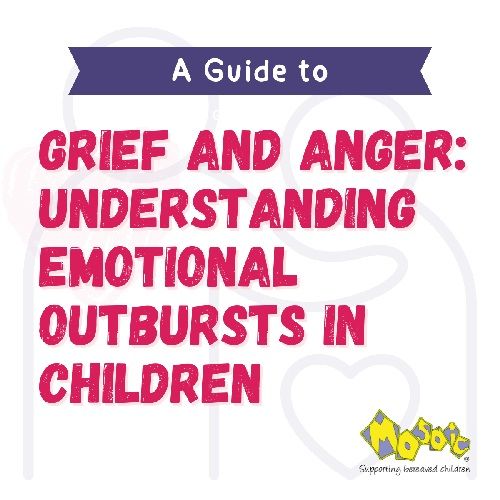Grief and Anger: Understanding Emotional Outbursts in Children

When a child experiences the loss of someone close, grief can show up in many different ways. While sadness, withdrawal or anxiety are common, anger is another powerful emotion that children may struggle to express. At Mosaic, we understand that these emotional outbursts can feel overwhelming, for both the child and the adults supporting them. Understanding why these reactions happen is the first step in helping a child navigate their grief safely and healthily.
Why Grief Can Lead to Anger
Grief isn’t just about sadness. For children, losing someone they love can bring up feelings of confusion, helplessness and frustration. Sometimes, anger is the emotion they can express most easily.
- Loss of control: children may feel powerless after a death. Anger can be a way of expressing the frustration of not being able to change what has happened.
- Fear and anxiety: children often don’t have the words to explain their fears about the future or the permanence of loss, so these feelings may come out as irritability or aggression.
- Misplaced blame: it’s common for children to blame themselves or others for a death and anger can be a way of expressing that confusion or guilt.
It’s important to remember that anger is a normal part of grief, even if it looks intense or seems disproportionate. These outbursts are a child’s way of signalling that they are struggling and need support.
Signs of Anger in Grieving Children
Children express anger differently depending on their age and personality. Common signs include:
- Tantrums or frequent outbursts
- Physical aggression, like hitting or throwing objects
- Verbal aggression, including shouting or name-calling
- Irritability or mood swings
- Withdrawal followed by sudden explosive behaviour
Recognising these signs early can help adults respond with understanding rather than punishment.
How to Support a Child Experiencing Grief-Related Anger
Helping a child manage their anger doesn’t mean ignoring the emotion, it means providing safe, constructive ways for them to express it. Here are some strategies:
- Stay calm and patient: your reaction sets the tone. Showing patience and calmness helps the child feel secure, even when they’re upset.
- Validate their feelings: let them know it’s okay to feel angry. Statements like, “I can see you’re really upset about this,” help children understand that their emotions are normal and accepted.
- Offer safe outlets: physical activity, art, writing or talking with a trusted adult can provide a constructive release for intense feelings.
- Set gentle boundaries: it’s okay to have rules about safety. For example, it’s acceptable to throw a ball outside but not to hit others. Boundaries give children a sense of structure during a confusing time.
- Encourage expression through conversation: ask open-ended questions like, “What’s making you feel angry today?” This can help children put words to their emotions and start processing their grief.
- Use storytelling or play: sometimes children express feelings through role-play or imaginative stories. These activities allow them to explore anger safely and symbolically.
- Seek professional support if needed: persistent anger, aggression or emotional outbursts that impact daily life may benefit from guidance from a child bereavement specialist or therapist.
How Mosaic Can Help
At Mosaic, we provide a wide range of support for children and families dealing with grief, including:
- One-to-one support: tailored sessions for children and young people to talk about their feelings and explore coping strategies.
- Family support: guidance for parents and carers to understand grief and support their child through emotional challenges like anger.
- Group sessions: safe spaces for children to meet peers who have experienced similar losses, helping them feel less alone.
- Advice and information: resources, guidance and practical tips for supporting children at home, at school or in everyday life.
- Support for schools and professionals: helping teachers and staff respond to grieving children in a safe and effective way.
All of our services are delivered by experienced professionals who understand the impact of grief and emotional outbursts. We aim to create a safe, supportive environment where children and families can express feelings, gain understanding, and begin to heal.
Supporting Yourself as a Caregiver
Watching a child struggle with grief and anger can be challenging. Remember to:
- Take breaks when needed, supporting a grieving child can be emotionally draining
- Seek guidance from bereavement services if you feel unsure how to respond
- Model healthy coping strategies, such as expressing your own emotions calmly
By taking care of yourself, you’re better equipped to help the child feel safe, understood and supported.
Anger is a natural part of grieving for many children. By understanding why these outbursts happen and providing a compassionate, structured response, adults can help children navigate their grief in a healthy way. Every child’s journey through loss is unique and patience, empathy and reassurance are powerful tools.
If you’re supporting a child through grief and struggling to manage anger or emotional outbursts, Mosaic is here to help. Our experienced team offers guidance, resources and support to help children, and the adults who care for them, cope with loss in a safe, understanding environment. Please get in touch if you have any questions.